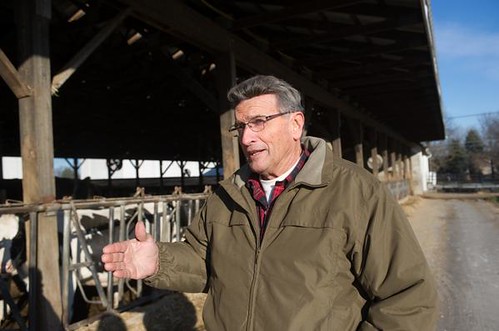Lancaster County, PA – Dairy farmer Luke Brubaker has managed risks well enough to establish a long history of successful, and environmentally friendly farming. At age 67, however, he recognizes that now is the riskiest time he has seen.
“Our costs to produce corn are now about as high as our gross revenue per acre was just three or four years ago,” said Brubaker. "The price of corn has doubled, but so have the costs. Our net profit is about the same as it was.”
Brubaker partners with his sons Mike and Tony to run Brubaker Farms in Lancaster County. They have a 750 cow dairy operation, produce 250,000 broilers a year, and farm more than 1,000 acres.
Crop Insurance More Important Now
The Brubakers experienced a severe drought in the 1980’s. “We didn’t have crop insurance, so we lost about $90,000. We didn’t have enough crop to feed our cows,” Brubaker said. “ I had to take out a loan and it took me five years to pay it off.”
That was an expensive lesson in risk management. Since then they have used crop insurance, investing in high rates of coverage. Their corn is now insured with Crop Revenue Coverage (CRC) at the 70-percent level.
“We had another loss in ’91 but that time we were covered,” Brubaker noted. “When you have a good year, you say, ‘why should I buy?’ The next year it is not raining and you say, ‘Boy, I’m sure glad I have crop insurance to rely on’.”
For Brubaker that is especially true now. “You’re handling a lot more money, which means you have to have a higher line of credit, which puts you at a lot more risk.”
Doing Good Leads to Doing Well
The Brubakers are involved in their community. Luke is on the Pennsylvania Milk Marketing Board and active in state and local organizations. Mike is chair of the Lancaster County FSA committee, and is on the Township Planning Commission. Tony was a member of the Pennsylvania Animal Health Commission from 2000-06, and all three are members of Farm Bureau and Lancaster Chamber of Commerce. Together they won the 1999 National Environmental Stewardship Award.
They also participate in the Chesapeake Bay Program. That environmental stewardship recently took a profitable turn. Doing good led to doing well.
This year, they completed construction of a manure digester for their dairy, generating enough electricity daily to meet the needs of 150 to 200 homes. This contributes to the energy security of Lancaster County, the reduction of greenhouse gases, and the reduction of nutrients reaching the Chesapeake Bay.
It also creates a profitable new stream of revenue and cuts costs in the dairy operation. Most of the electricity they generate is sold back to the local electric utility. After the methane is used up, the solids are separated from the liquid (they are now free of pathogens) and reused as bedding for the cows, eliminating a cost from the operation. Brubaker jokes that, “Now we are making profit out of the back end of the cow.”
But there is nothing funny about the serious approach that the Brubakers take in managing their risks and managing what they see as their obligations to the environment.


